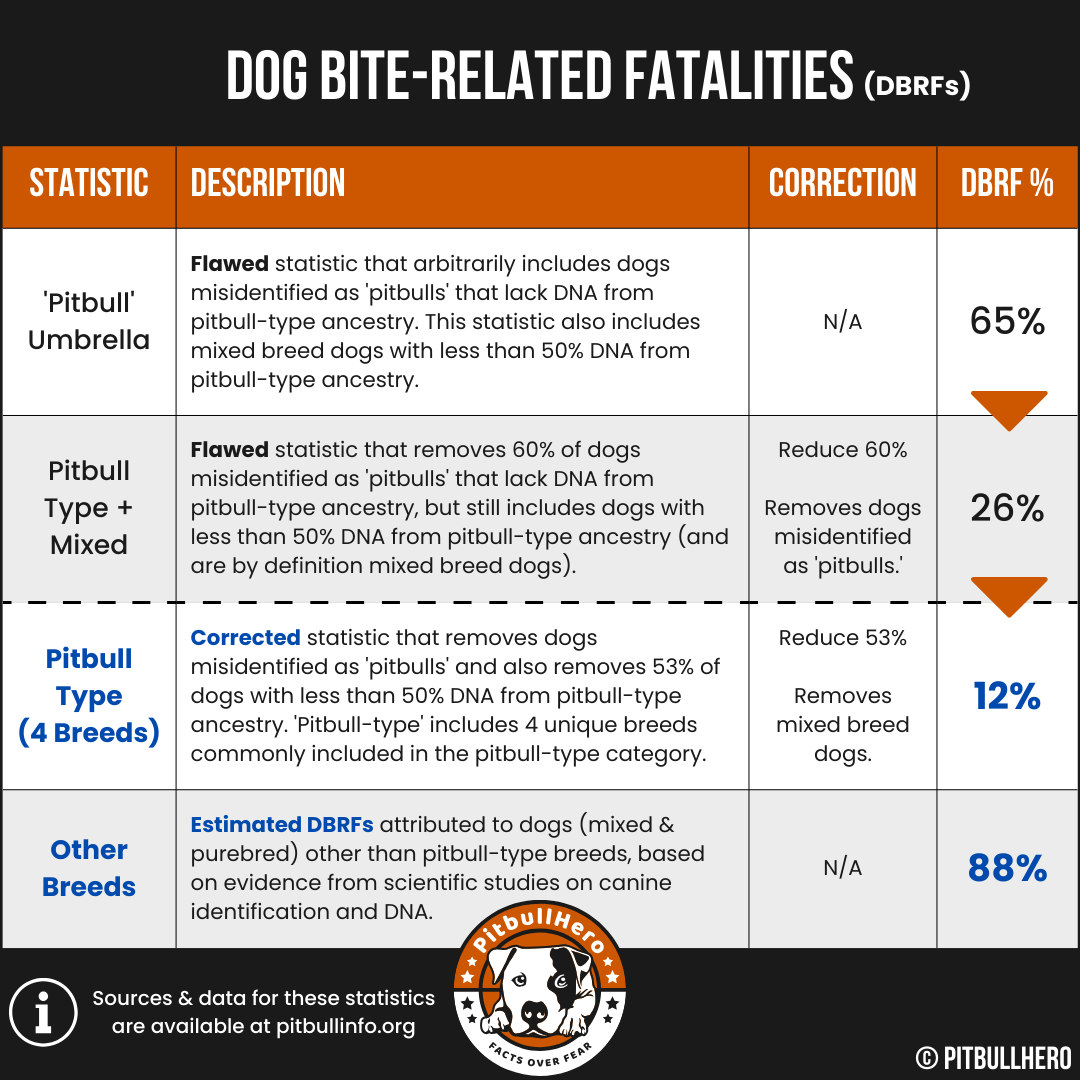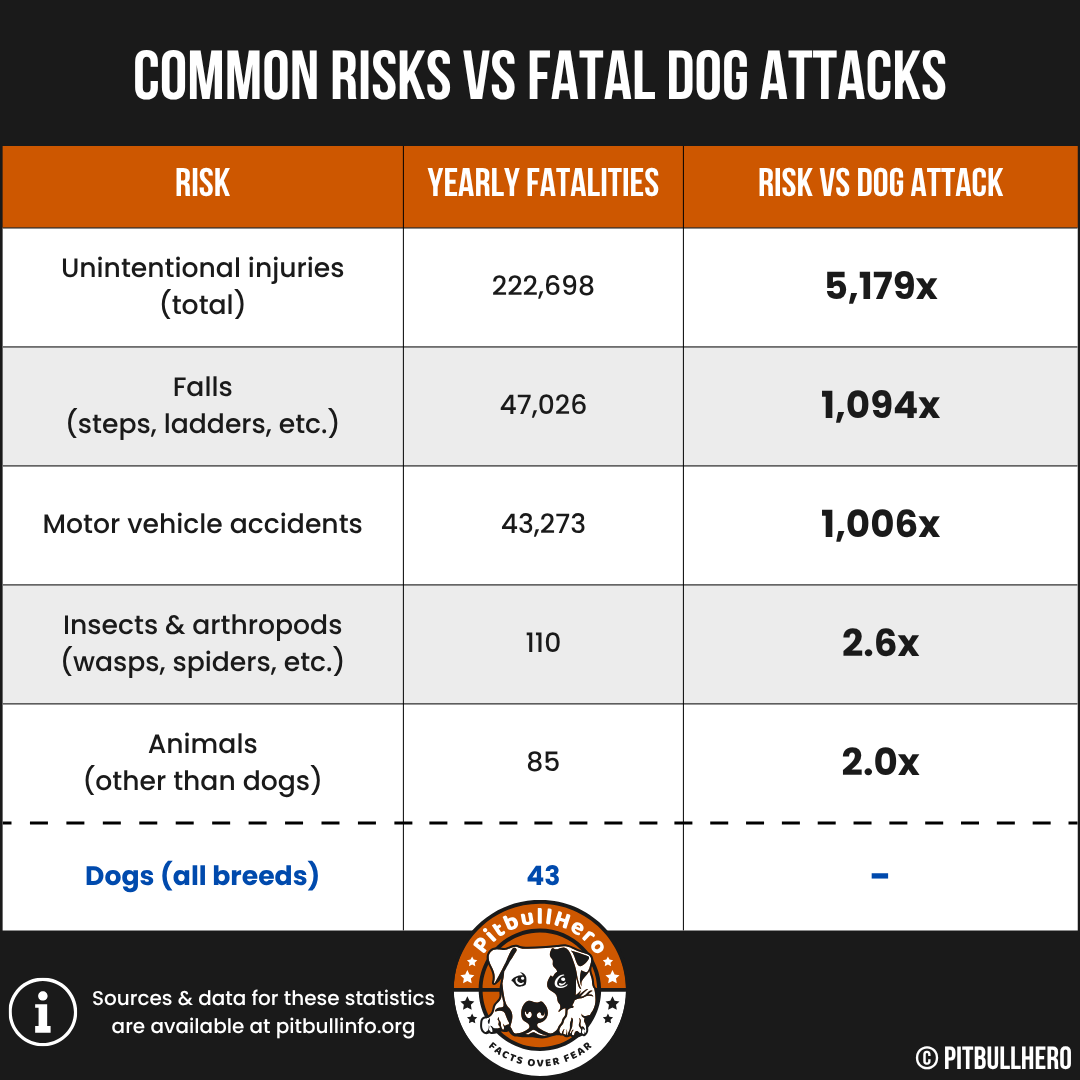Dog Bite-Related Statistics
83+
Number of breeds reported in fatal attacks in the U.S. since 2016, confirming that serious dog-bite incidents are not a breed-specific issue.
0.00001%
60%
Average percentage of dogs misidentified as 'pitbulls', lacking any DNA from pitbull-type ancestry.
According to CDC data, there are an average of 43 fatal dog attacks each year in the United States, disproportionately affecting adults (~65%), followed by children (~25%) and infants (~10%). Since 2016, at least 83 different breeds and mixed breeds have been reported in fatal attacks, including Akitas, Boxers, Doberman Pinschers, German Shepherds, Great Danes, Huskies, Labrador Retrievers, Mastiffs, Rottweilers, and pitbull-types, among others. Scientific studies have determined that the leading causes of fatal dog attacks stem from preventable factors such as irresponsible ownership, neglect or abuse, failure to neuter dogs, and inadequate supervision of large or strong dogs around infants and children. Contrary to unreliable information about breed-specific risk related to certain breeds, the American Veterinary Medical Association (AVMA), the Centers for Disease Control and Prevention (CDC), and numerous studies have determined that a dog's breed does not determine aggression, bite strength, or its propensity to bite. While every fatal dog attack is tragic, the majority of dog bite-related fatalities (DBRFs) are the result of human-controlled factors specific to the circumstances surrounding the incident. Below, we provide statistics relevant to fatal dog attacks and dogs labeled as 'pitbulls.'
83+ Breeds Reported In Fatal Dog Attacks
Since 2016, at least 83 different breeds and mixed breeds have been reported in fatal dog attacks in the U.S., including Akitas, Boxers, Doberman Pinschers, German Shepherds, Great Danes, Huskies, Labrador Retrievers, Mastiffs, pitbull-type dogs, Rottweilers, and many others. The diversity of breeds involved underscores findings from multiple scientific studies: a dog's breed does not determine aggression, bite strength, or its propensity to bite. Furthermore, the data also shows that breed-specific legislation (BSL) is ineffective and obsolete, as serious dog bite incidents involve a wide array of breeds and mixes, not just those targeted by BSL.
Deconstructing Flawed Pitbull Statistics
Comprehensive studies on canine DNA and visual breed identification have determined that 60% of dogs identified as 'pitbulls' lack DNA from the recognized pitbull-type breeds. This discrepancy leads to exceedingly inaccurate breed information in media coverage and in unreliable statistics on dog bites and attacks. Additionally, the studies show that most dogs with pitbull-type ancestry have less than 50% DNA from pitbull-type breeds and are therefore, by definition, mixed-breed dogs. Flawed statistics from unscientific organizations and special interest groups advocating for breed-specific legislation (BSL) quickly fall apart when considering evidence from studies on canine DNA.

Pitbulls Represent 20% of the Dog Population
Dogs labeled as 'pitbulls' are the most popular dogs in the U.S., more popular than Labrador Retrievers, Golden Retrievers, Boxers, German Shepherds, Huskies, Rottweilers, and others, as revealed by a recent analysis of veterinary data. Additionally, they are the #1 most commonly identified breed in DNA-tested dogs. While the American Pit Bull Terrier is a distinct breed, the broader label of 'pitbull' is not a breed but rather a generic term used to describe a type of dog based loosely on its appearance, resembling any medium-sized dog with physical characteristics from any of the numerous bully-type breeds. Accordingly, as the term 'pitbull' includes the four unique breeds commonly included in the pitbull-type category, a wide variety of pitbull-type mixes, and other breeds and mixes labeled as 'pitbulls' because of their appearance, we conservatively estimate that they represent 20% of the dog population in the U.S.
Fatal Dog Attacks Are Rare
Fatal dog attacks are exceedingly rare; on average, every year in the U.S., insects (stings and bites) cause more fatalities (approximately 110) than dogs (approximately 43). While serious dog bite-related incidents unfortunately occur, dogs represent one of the lowest safety risks to people. The risk of being fatally attacked by a dog (of any breed) is 0.00001%, given an average of 43 fatal attacks annually and a population of 340 million. In comparison, many other common risks are significantly higher than fatal dog attacks.
Sources:
- CDC FastStats - Unintentional injuries, motor vehicle accidents, & falls (2023)
- CDC WONDER - Insects & arthropods (2018-2023 average/year)
- CDC WONDER - Animals other than dogs (2018-2023 average/year)
- CDC MMWR/WONDER - Dogs (2011-2021 average/year)

Breed-specific bans are a simplistic answer to a far more complex social problem, and they have the potential to divert attention and resources from more effective approaches.
